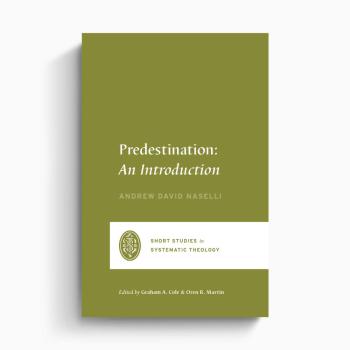Review of The Envy of Eve: Finding Contentment in a Covetous World by Melissa B. Kruger
By ALEXIS NEAL
Covetousness is a mother sin. […I]t is a breach of all the ten commandments. ~Thomas Watson
Have you ever considered that the Ten Commandments begin and end with virtually the same commandment—‘You shall have no other gods before me’ and ‘You shall not covet’? These are almost equivalent commands. Coveting is desiring anything other than God in a way that betrays a loss of contentment and satisfaction in him. Covetousness is a heart divided between two gods. So Paul calls it idolatry. ~John Piper
Confession: I am an envious person. I am so envious, in fact, that I am capable of envying things I do not even want. I am that good. Er, bad. I certainly struggle with envy. (Ok, ok, sometimes I don’t actually struggle with it. On occasion, we meet quite cordially, and I have even been known to invite it in for lemonade and finger sandwiches. However, in my more spiritually discerning and holier moments, I very much want to toss envy out on its ear.)
And so, in an attempt to murder this particular deadly sin, I have been on the prowl for solid Christian resources on the subject. To my great surprise (and disappointment), the pickin’s have been on the slender side: a handful of sermons and not much else, unless I want to browse the Catholic aisle of my local online book retailer. How very frustrating! Either I am the only Evangelical who struggles with envy (which seems unlikely), or there is, perhaps, a supply-demand discontinuity at work here.
Enter Melissa B. Kruger. God bless Melissa B. Kruger.
In my search for assistance in thinking through and battling my envy, I stumbled across a flyer for a conference at Reformed Theological Seminary in Charlotte, North Carolina. The conference dates were long past, but the talks were available online. Melissa B. Kruger, the wife of RTS-Charlotte President Mike J. Kruger and the Women’s Ministry Coordinator at Uptown Church (PCA) in Charlotte, was one of the keynote speakers at the conference, and after listening to her talks, I immediately added her book to my wish list.
It is fantastic, and an invaluable resource for my life and the lives of others I know. In fact, it’s so fantastic that I don’t really have much to offer in the way of a meaningful critique, so instead I’ll just summarize Kruger’s points and encourage you to READ THIS BOOK.
The title of this book refers to the sin of envy, but it would be more accurate to say this is a book about the sin of covetousness (which lacks the alliterative potential of ‘envy’). The distinction between the two may not be immediately apparent—we certainly conflate the two in common parlance. However, where ‘envy’ connotes the desire for something possessed by another (and thus may seem an imprecise descriptor of Eve’s sinful motivation in eating the forbidden fruit), ‘covetousness’ is defined here as ‘a culpable or inordinate desire to possess, often that which belongs to another’ (p. 24). Thus while it is possible to covet bad things (culpable desires) or to covet good things (by desiring them too much), any desired thing may—but does not always—belong to someone else. 
For Kruger, the root of covetousness is, quite simply, unbelief. This is a truth that I am discovering on a regular basis—that my besetting sins result not from a lack of effort (alone), nor from a lack of ability, nor from any other more physical shortcoming: they result from a lack in my faith. When I sin, it is a clear sign that there is some piece of the Gospel that I do not believe, some characteristic of God and His work that I ignore or deny.
In the case of covetousness, Kruger argues that the root unbelief is three-fold: unbelief in the character of God (specifically His sovereignty and goodness), unbelief in our purpose (that we were created to be in relationship with and glorify God and to be with Him for all eternity), and unbelief in our relationships. If these are the root cause of envy, it follows that the remedy is to increase our belief that God is in fact both good and sovereign, that our relationship with Him matters more than (and will outlast) our circumstances, that He will bring glory to Himself through those circumstances, that He knows which circumstances will maximize our sanctification and long-term joy, and that we can therefore celebrate the blessings received by others. Preach it, sister.
But Kruger doesn’t stop there. Through studying the biblical examples of Eve and Achan, Kruger posits a four-step pattern of coveting: First, we see the object of our desires. Then we covet it—that is, we begin to harbor a sinful desire for the object. Then this inward desire bears fruit in the outward action of taking, followed by an attempt to hide our sin. See, covet, take, and hide. Although both Eve and Achan’s coveting led to physical ‘taking’, it is also possible for this step to take a more metaphorical form—taking from another’s joy by failing to celebrate with her, for example. Really, the ‘taking’ step is shorthand for the sinful ‘actions’ that inevitably flow out of the sinful desire of coveting.
In contrast to this sinful pattern, Kruger points to the example of Christ. When tempted, Christ did not yield to the pattern of coveting. Instead He defeated it, relying on a deep understanding of and belief in the Scriptures (which Kruger argues is key in our own battle against coveting–Amen to that). Because of Christ’s perfect life and atoning death on the cross, Christians have been set free from the penalty and power of sin, and can now embark on a new pattern of righteousness through the Gospel: Seek the Lord, desire rightly, give generously, and confess freely.
I love this.
The pattern Kruger sets forth is simultaneously something that I do while also something that God in Christ does in me. It gets me off my duff, yet brings me to my knees before the throne, pleading for grace and strength. Strength to fix my eyes on Christ rather than the objects of my desire. Strength to submit those desires to the will of my King. Strength to reflect my trust in His goodness and provision by giving generously to others (even those who possess what I myself long for). And strength to confess—to Him and to my brothers and sisters—the many, many ways in which I fail.
The struggle between passivity and legalism is a difficult one, and any proffered solution runs the risk of becoming a religious to-do list. Kruger’s suggested approach walks the line well, constantly focusing on Christ’s finished work and final victory in the Gospel, while still exhorting believers to take up arms against their sin.
From there, Kruger walks her readers through Biblical examples of coveting in specific contexts: money and possessions (Judas), romantic relationships (David and Bathsheba), family relationships (Joseph’s brothers), circumstances (the Israelites in the desert), and gifts and abilities (Korah). For each biblical example, Kruger explains how those involved lived out the coveting pattern: they saw, coveted, took, and hid—and so too do we. She then offers suggestions for replacing this sinful pattern with the new pattern of seeking God, desiring rightly, giving generously, and confessing freely. There’s a lot of repetition across these five chapters, but not to an annoying degree. Besides, this enables each chapter to function as a stand-alone, enabling pressed-for-time readers to flip to the most applicable chapter and ingest the full substance of Kruger’s points.
Honestly, I cannot praise this book enough. The awful and disgusting sin of envy has wrapped its slimy tentacles around so many hearts; this is a huge and pervasive problem. I am very grateful to Melissa B. Kruger for seeing that need and then taking the time to think and study through what God’s Word says about that need and share those findings with the world. This book is nothing short of a Godsend in my own life, and I fully intend to share the blessing with others. (And since the chapters come complete with reflection and discussion questions, the book is ready-made for small group study.)
[A note to our male readers: the book is written by a woman, is directed primarily toward women, and engages many common areas of envy among women. This does not mean that it can only be used by or for women. The biblical analysis here is solid, and the truth and application—like the sin of envy itself— transcend gender. So if you are a man struggling with envy or covetousness or even just discontentment, you would do well to give this book a read.]
_______________________________________________________________
Alexis Neal is an attorney in the Washington, D.C., area. She regularly reviews young adult literature at www.childrensbooksandreviews.com and everything else at quantum-meruit.blogspot.com.












